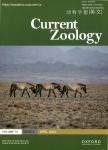Smaller and bolder prey snails have higher survival in staged encounters with the sea star Pisaster giganteus
Smaller and bolder prey snails have higher survival in staged encounters with the sea star Pisaster giganteus作者机构:Department of Ecology Evolution and Marine Biology University of California Santa Barbara Santa Barbara CA93180 USA
出 版 物:《Current Zoology》 (动物学报(英文版))
年 卷 期:2017年第63卷第6期
页 面:633-638页
核心收录:
学科分类:0710[理学-生物学] 07[理学] 0905[农学-畜牧学] 0906[农学-兽医学]
基 金:by the University of California, Santa Barbara as start-up to J.N.P., NSF grant awards to J.N.P. an NIH grant awarded to J.N.P
主 题:behavioral syndrome behavioral type personality predation risk survival selection temperament
摘 要:Temporally consistent individual differences in behavior, also known as animal personality, can have large impacts on individual fitness. Here, we explore the degree to which individual differences in anti-predator response (or boldness) influence survival rates in groups of snails when they encounter a predatory sea star . The snail shows consistent individual variation in predator response where some fearful snails actively flee bodies of water occupied by predators whereas bolder snails consistently do not. We show here that bold snails are significantly more likely to survive encounters with a predatory sea star and, somewhat counterintuitively, fearful snails actually suffer higher mortality rates. We also found that smaller snails and those occurring at higher experimental densities experienced higher per capita survival rates. Positive effects of prey boldness on survival are not uncommonly reported in the animal personality literature; however, such results are inconsistent with classic animal personality theory borrowed from the optimal foraging literature. The findings herein add to the growing body of evidence that consistent individual differences in behavior can impact predator-prey interactions and that boldness is potentially under positive predator-driven selection in some systems.



